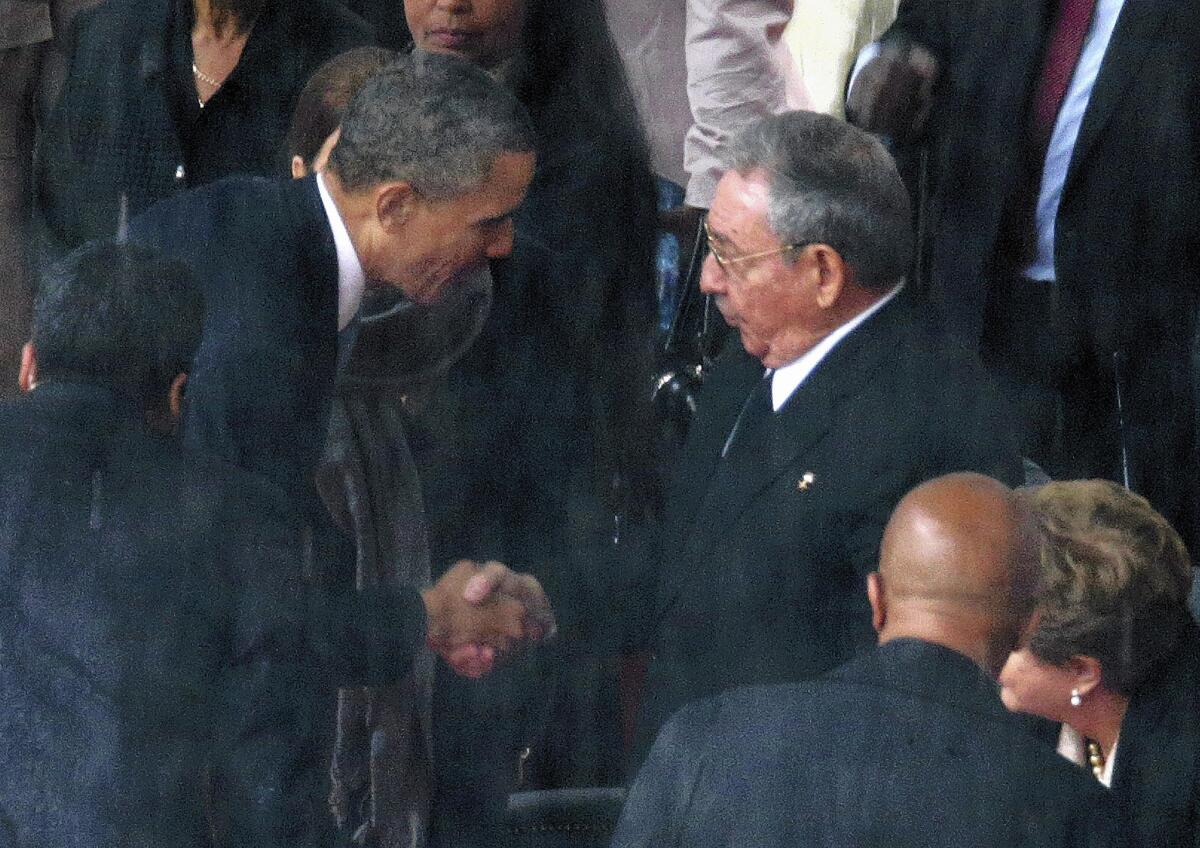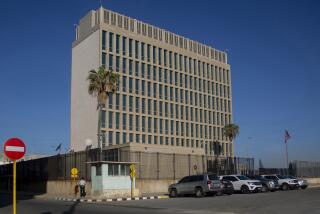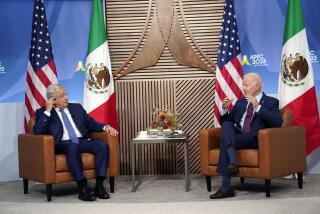Obama handshake with Cuba’s Castro stirs reaction

WASHINGTON — Even in death, Nelson Mandela brought together unlikely bedfellows.
Mandela’s memorial Tuesday drew dozens of dignitaries and heads of state, including a U.S. president and three former ones, a bipartisan congressional delegation and leaders from around the world. Each brought a tangle of tricky relationships that had to be, at least publicly, set aside to honor a man who championed reconciliation.
For President Obama, that meant encounters that ranged from awkward to outright controversial.
Among the latter was a seemingly amiable handshake and chat with Cuban President Raul Castro, who was seated in the same VIP section as Obama, which yielded a photo that immediately caused a stir.
It was the first such contact between a U.S. and Cuban president in 13 years, a White House official said. President Clinton was believed to be the first U.S. president to breach the Cold War-era policy of no contact when he shook then-President Fidel Castro’s hand in 2000 at the United Nations.
Like officials then, the Obama administration did not assign extra meaning to the encounter, saying it was not arranged and that the president was focused on honoring Mandela.
“Nothing was planned in terms of the president’s role other than his remarks,” deputy national security advisor Ben Rhodes said. “The president didn’t see this as a venue to do business.”
Still, a handshake with the leader of a nation that’s been a foe for half a century is never just a handshake. Obama has said he plans to rethink U.S. policy toward Cuba, and he already has loosened some restrictions on travel. In that light, the moment was dissected and condemned by some at home, where the politics involving communist-run Cuba cuts deep divisions.
On Capitol Hill, Rep. Ileana Ros-Lehtinen (R-Fla.) grilled Secretary of State John F. Kerry about whether Obama’s decision to shake “the bloody hand” of the Cuban leader represented an easing of policies. It did not, Kerry said.
Sen. John McCain (R-Ariz.) told reporters that Obama was feeding the propaganda machine that props up Castro’s “dictatorial regime.” “Why should you shake hands with somebody who is keeping Americans in prison? What’s the point?” McCain said. Making reference to the British prime minister known for his appeasement policies in the lead-up to World War II, he added, “Neville Chamberlain shook hands with Hitler.”
Sen. Marco Rubio, another Florida Republican and the son of Cuban immigrants, suggested Obama could have made better use of the encounter.
“If the president was going to shake his hand, he should have asked him about those basic freedoms Mandela was associated with that are denied in Cuba,” he said.
The White House noted that Obama, in remarks using Mandela’s clan name, did call out unnamed leaders who “claim solidarity with Madiba’s struggle for freedom but do not tolerate dissent from their own people.”
The handshake wasn’t the only diplomatic test at the high-powered gathering in Johannesburg, South Africa. No sooner had Obama finished with Castro than he turned to the next leader in the row: Brazilian President Dilma Rousseff.
Rousseff made headlines this fall when she canceled a trip to Washington over reports that the U.S. had spied on Brazilian leaders. Obama had failed to smooth the feathers of Rousseff at a meeting of world leaders in Russia in September. On Tuesday, she received — and accepted — two air kisses from the president.
Obama talked to Rousseff briefly, Rhodes said, although not about the “surveillance concerns.”
The president also greeted Afghan President Hamid Karzai, who has been causing U.S. officials headaches for refusing to sign a security accord on the terms for a continued U.S. military presence in his country.
The history-making memorial service was a hot ticket for U.S. lawmakers and offered the White House a chance to do a little congressional outreach. The delegation of lawmakers that traveled to South Africa included several Democrats from the Congressional Black Caucus, as well as Illinois Republican Rep. Aaron Schock and Texas Republican Sen. Ted Cruz, the latter among Obama’s toughest critics in the Senate.
The journey also promised another opportunity for political reconciliation. Obama has a history of friction — both ancient (by Washington standards) and fresh — with others who joined him on the African sojourn. Obama invited his onetime political foil, former President George W. Bush, and his wife, Laura Bush, to fly with him.
The White House gave little insight into their conversations. Spokesman Jay Carney said the presidents and their wives congregated at times in a conference room on Air Force One, sharing their memories of Mandela.
“It’s a unique experience, obviously,” Rhodes said.
kathleen.hennessey@latimes.com
Times staff writer Michael A. Memoli contributed to this report.
More to Read
Start your day right
Sign up for Essential California for news, features and recommendations from the L.A. Times and beyond in your inbox six days a week.
You may occasionally receive promotional content from the Los Angeles Times.







